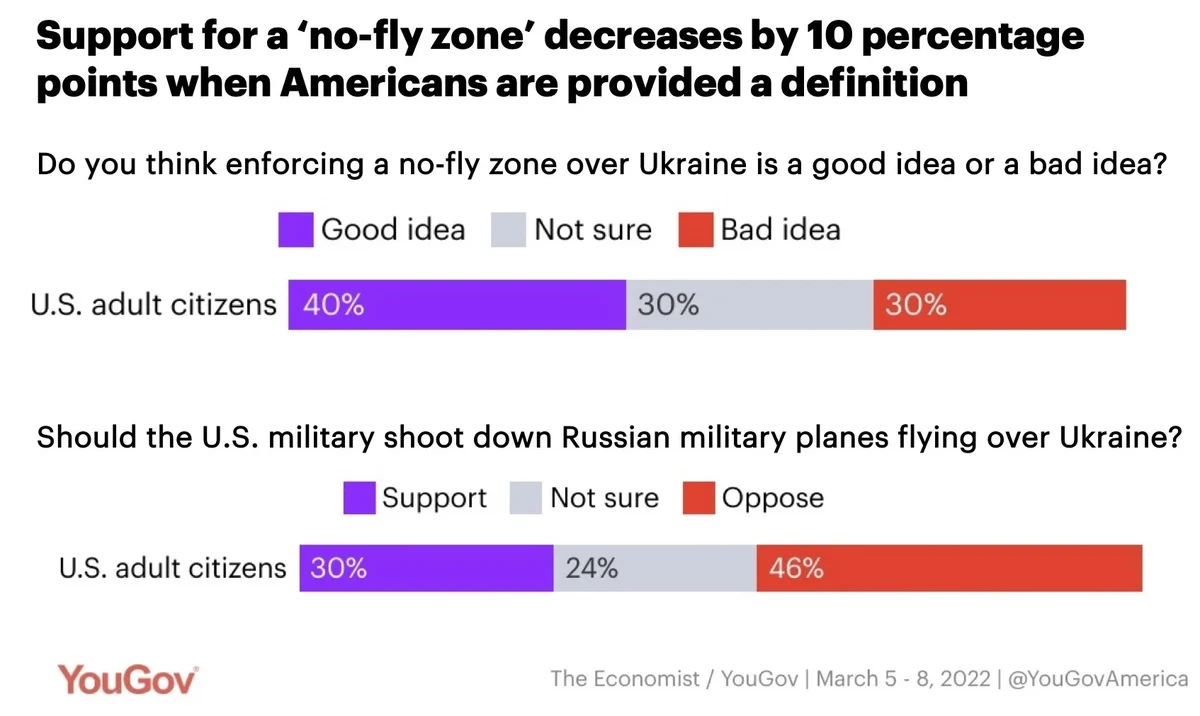In last week’s Economist/YouGov Poll, 45% of Americans said they approved of enforcing a “no-fly zone” over Ukraine, while 20% disapproved. This week, the share of Americans who support a no-fly zone has fallen to 40%, while the share who oppose it has risen to 30%.
But do Americans understand what enforcing a no-fly zone would entail, and if they don’t, would they support it if they did? Our most recent poll attempts to find out. It includes an additional question which defines a no-fly zone without using that name for it, rather than asking if people support the concept by name without a definition.
We find that when Americans are asked whether the U.S. military should shoot down Russian military planes flying over Ukraine, just 30% support the idea, 10 percentage points lower than the share who call a no-fly zone a good idea. And 46% of Americans oppose shooting down military planes, 16 percentage points higher than the share who call a no-fly zone a bad idea.

These findings suggest that some Americans may not be aware of what enforcement of a no-fly zone would involve. Nearly three in 10 of those who say that enforcing a no-fly zone is a “good idea” also say that they oppose the U.S. shooting down Russian military planes flying over Ukraine; 13% of those who call enforcing a no-fly zone a bad idea support the U.S. shooting down Russian planes
Other factors could also explain some of the difference in opinion between the two questions about a no-fly zone. For example, one asked whether it was a good idea, the other whether people supported it. To test the effect of one specific wording change, YouGov asked a randomly selected half of the people who participated in a U.S. News poll this week, “Would you support or oppose the U.S. enforcing a no-fly zone over Ukraine?” The other half were asked, “Would you support or oppose the U.S. enforcing a no-fly zone over Ukraine, which would mean the U.S. military would shoot down Russian military planes flying over Ukraine?” Americans were equally likely to say they supported enforcement of a no-fly zone with either question, but the share who opposed it was 5 percentage points higher when the consequences were spelled out. Further study could help further clarify how Americans feel about the substance of a no-fly zone over Ukraine and how they feel about the name “no-fly zone” alone.
See the toplines and crosstabs from this Economist/YouGov Poll
See the toplines and crosstabs from this U.S. News Poll
Economist/YouGov Methodology: The Economist survey was conducted by YouGov using a nationally representative sample of 1,500 U.S. adult citizens interviewed online between March 5 - 8, 2022. This sample was weighted according to gender, age, race, and education based on the 2018 American Community Survey, conducted by the U.S. Census Bureau, as well as 2016 and 2020 Presidential votes (or non-votes). Respondents were selected from YouGov’s opt-in panel to be representative of all U.S. citizens. The margin of error is approximately 3% for the overall sample.
U.S. News Poll Methodology: This U.S. News survey was conducted by YouGov using a nationally representative sample of 1,000 U.S. adult citizens interviewed online between March 7 - 9, 2022. This sample was weighted according to gender, age, race, and education based on the 2018 American Community Survey, conducted by the U.S. Census Bureau, as well as 2016 and 2020 Presidential votes (or non-votes). Respondents were selected from YouGov’s opt-in panel to be representative of all U.S. citizens. The margin of error is approximately 3% for the entire sample.
Image: Getty











